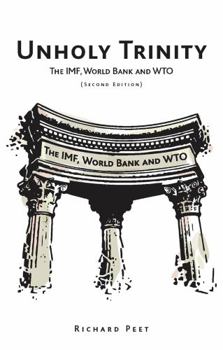Unholy Trinity: The Imf, World Bank and Wto
Select Format
Select Condition 
Book Overview
Who really runs the global economy? Who benefits most from it? The answer is a triad of 'governance institutions' - The IMF, the World Bank and the WTO. Globalization massively increased the power of... This description may be from another edition of this product.
Format:Hardcover
Language:English
ISBN:1842770721
ISBN13:9781842770726
Release Date:August 2003
Publisher:Zed Books
Length:272 Pages
Weight:0.70 lbs.
Dimensions:0.9" x 5.6" x 8.9"
Customer Reviews
5 ratings
Whose Hitler?
Published by Thriftbooks.com User , 17 years ago
In a word, if you like living in a sovereign nation, then write your Congressional representive, your Senators, and have the US removed from these organizations. There is a real bad element here. World domination bad.
good class action
Published by Thriftbooks.com User , 19 years ago
This is what university work should be like: a professor leading a group of studnets in common action and collectieley publishing their work. Well done. Lots of good points which the unholy trinity should answer in some forum or other. All three organs are dominated by the US as Stiglitz, Bellamy and others have pointed out. Whether US hegemony is a good or bad thing is a different question. I felt the book could have done without Foucault, who has little to contribute on the parameters of discourse or much else. The fact is the budgets of these institutions dwarf all others and it makes a welcome change to see an articulate counter point of view, especially as it was a grassroots student project. Definitely worth a read.
The Politics of Writing
Published by Thriftbooks.com User , 20 years ago
The Writers of books like Unholy Trnity make very little money for their hard work (usually a few hundred dollars a year for 3-4 years). They write books like this out of political commitment. And then people like "Not Right" (though he or she probably is, Right Wing) criticize the author for responding to an obviously political critique! This book, as the Publishers Weekly review says, provides a scholarly grounding for the anti-WTO, IMF and World Bank protests. The group of students and faculty who worked on it did a splendid job. Read it and you will see.
Florida again
Published by Thriftbooks.com User , 20 years ago
The Florida reviewer criticizes the book's discussion of Foucault, but doesnt know how to spell his (Foucault's) name! Specify the criticisms so they can be replied to. Dont leave them as empty words. So the concept of hegemony used in the book, or which data are not backed up with sources? I dont find any. What we have here is a political attack disguised as a factual review.
Posing new questions, not answering ready-made ones
Published by Thriftbooks.com User , 20 years ago
I am a contributing author to this book. This book was written over a period of two years, during which the authors carried an extensive and detailed research on how the global institutions came to be central actors in the contemporary global political economy, and why do they operate the way they do. We looked into the internal structure of these institutions, the broad political and economic context in which they emerged, and their historical transformations in the face of a changing world, in order to deconstruct their seeming inevitability and neutrality, and to situate them in real historical-geographical circumstances. We sought to explain and criticize the instrumental role these institutions play in producing economic and geographical inequality, and massive human misery all over the world in the name of development. The authors were not "obliged to give a negative view" because of the title of the book, as our `critic' suggests, rather, because of what we found in researching the history and geography of these institutions. (And, for the authors, an unholy trinity sounds as "negative" as a holy one!)We do not pretend to approach the subject with a neutral, apolitical attitude-our ultimate aim in writing this book is to explore different possibilities, and different worlds. Like our critic, we wonder what kind of world it would be without the IMF, the World Bank and the WTO; but we wonder for the future, not to justify and apologize for the past and present (mis)deeds of these institutions. We deliberately did not present "the other side"-by which is meant the global institutions' view of themselves; the reader can find such views in the many publications of the institutions and their apologists. They're literally all over the place, and this is one reason that motivated us to work on an alternative view, a different history. For not presenting arguments in favor of these institutions (although we always present them at length where we criticize them!), and although he finds the text "sometimes hard to understand" (quoting sentences out of context to demonstrate), our critic describes our analyses as superficial, and the discussion shallow. Maybe our critic was expecting to read another kind of book; better, maybe our critic would like to read the book again, and give another thought to what is truly "the other side".





